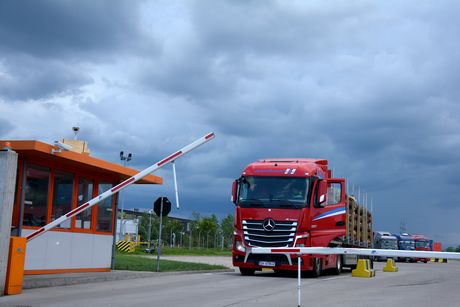Holzindustrie Schweighofer: Second year of successful implementation of the action plan for a sustainable wood industry in Romania
- Comprehensive set of measures focusing on strict control and increased transparency and dialogue
- 28,000 transports available on the Timflow public platform, the company’s GPS tracking system for saw log deliveries
- Openness and dialogue: 120 Romanian and international journalists visited mills in the past two years
- Afforestation initiative: One million Euros for one million trees until 2024
- The company’s first Sustainability Report is available online
Implemented since January 2017, the Holzindustrie Schweighofer action plan for a sustainable timber industry in Romania includes a comprehensive set of measures to fight the phenomenon of illegal logging in Romania and to support the sustainable development of the wood industry. The measures greatly exceed the requirements of Romanian laws and regulations, and the company invested more than one million Euros into the strict security architecture for its supply chain. Two years after implementation, here is a brief overview of what was achieved.
Strict controls and protection of sensitive forest areas
Since April 2017, all truck deliveries to the Holzindustrie Schweighofer mills are monitored via the Timflow GPS system. More than 800 trucks are equipped with dedicated GPS devices and the routes travelled are recorded with great precision. As a unique transparency measure in Romania, Holzindustrie Schweighofer makes available on www.timflow.com the GPS maps and photos of the loaded trucks before departure. Currently, more than 28,000 transports recorded in the past 12 months are available on the platform.
Strict traceability measures, including wood supplied from log yards, ensure that our suppliers respect our Zero logs from national parks policy. For on-site verifications and audits of suppliers, Holzindustrie Schweighofer’s compliance teams travel up to 5,000 km a month. At the same time, we have continued enforcing our Zero tolerance policy for saw log deliveries from controversial sources. During 2018 alone, eight companies were suspended from our supply chain for failures to comply with the Holzindustrie Schweighofer Timber Sourcing Policy.
Transparency and dialogue
Throughout 2018, we have continued a steady dialogue with our stakeholders, resulting in the publication of the first Holzindustrie Schweighofer Sustainability Report. Prepared according to the Global Reporting Initiative (GRI) standards, the report offers a comprehensive outlook on the company’s core business, as well as its place in the context of the Romanian wood processing industry.
During the past year, we have continued our Open doors policy for media and NGOs. Almost 120 journalists from Romanian and international media visited the Holzindustrie Schweighofer mills and offices in the past two years. NGO representatives and other visitors, such as MEP Thomas Waitz (Greens), witnessed first-hand our enhanced security architecture, including the operations of our traceability system Timflow (link to press release). Our regular public consultations on topics regarding supply chain security continued as well, with about 750 participants in the past two years, representing NGOs, businesses, public authorities and the academia.
Reforestation of areas with forest regeneration issues
Launched in the autumn of 2017, the Tomorrow’s Forest initiative aims to plant one million seedlings and follow-up with monitoring and maintenance for at least seven years, until 2024. After the kick-off planting action in November 2017, the project sparked great enthusiasm, with more than 1,000 volunteers joining planting actions in the spring of 2018. More than 160,000 seedlings have been planted so far, on eight plots across the Carpathian Mountains. A dynamic overview of all planting actions is available here.
Over the spring of 2019, the initiative will continue planting at an accelerated pace – eight new plots have been identified in six Romanian counties, with a total area exceeding 40 ha. At the same time, the areas planted last year will undergo substantial tending works – weeding and cleaning treatments, and supplementary plantings where needed. The full schedule and locations will be announced shortly on the project website.
Michael Proschek- Hauptmann, Head of Compliance and Sustainability of the Schweighofer Group: “Sustainability is an essential part of our mission statement. We hope to send a clear signal of our commitment and to convey that we see criticism as an engine for greater transparency and dialogue and are thus taking appropriate measures.”
